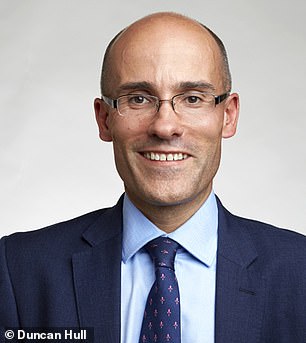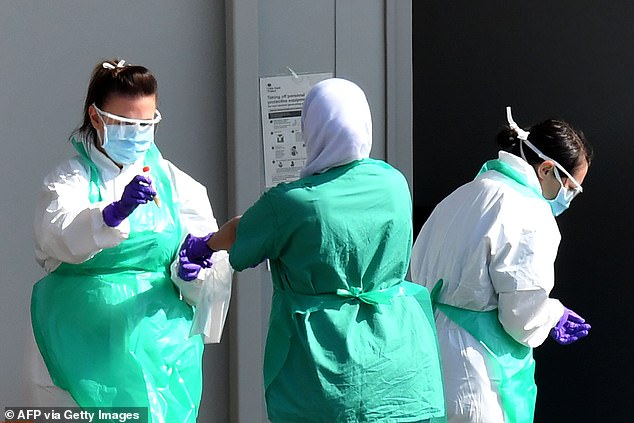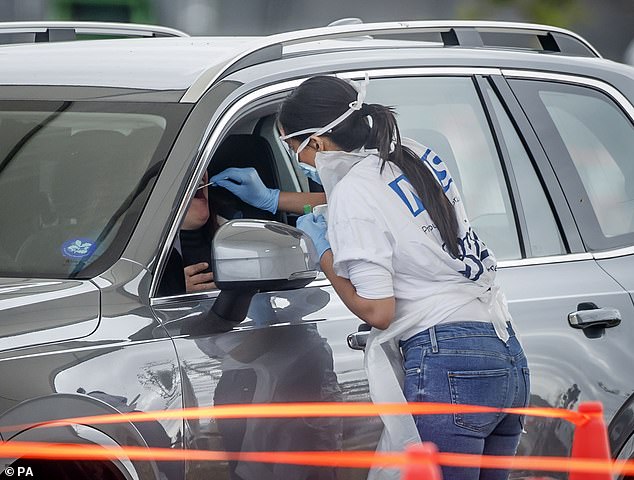NHS workers should be screened for coronavirus EVERY WEEK to protect patients from catching the deadly infection, leading expert says
- Professor Charles Swanton said medics are spreading the disease in hospitals
- He has called for screening to find positive cases who show no symptoms
- Evidence shows asymptomatic cases account for 40-80% of transmission
- And people may be their most contagious two days before symptoms appear
- Experts say people fear going to hospitals because of the risk of COVID-19
- Learn more about how to help people impacted by COVID

Professor Charles Swanton, who heads the Francis Crick Institute, argued healthcare workers are spreading the disease ‘right in front of our eyes’
Healthcare workers should be screened for coronavirus every week to protect patients from asymptomatic infection, a leading expert has said.
Professor Charles Swanton, who works at the Francis Crick Institute, argued one of the main routes of transmission – in hospitals – is ‘right in front of our eyes’.
Hospitals are believed to be a hotbed of virus transmission, which may be driving new cases across the UK.
It could also be putting people visiting hospital for non-coronavirus reasons, such as for a heart attack, stroke, or cancer treatment, at risk of becoming infected.
But medics may have no idea they are spreading the virus because they don’t show the tell-tale symptoms of a persistent cough or fever.
Evidence is starting to show transmission from asymptomatic patients accounts for between 40 to 80 per cent of COVID-19 cases.
And yesterday, a study from China showed those carrying the killer infection were most contagious to others two days before symptoms appeared.
It comes as it was revealed last night that a pilot is starting this week of home swab test kits that will be delivered by Amazon, starting with key workers.

Pictured: Medical staff wear PPE as they prepare to store samples after testing a NHS worker at a drive through at Hopwood Hall College in Rochdale, Greater Manchester
‘For all our fuss about social distancing we’re ignoring one of the main routes of infection in front of our eyes,’ Professor Swanton told The Guardian.
‘It’s almost untenable to argue you shouldn’t be screening and isolating healthcare workers.’
Currently NHS workers can get a swab test if they have symptoms and are referred. Some 23,740 key workers and their family members have been tested so far.
A third (7,900) have come back positive – and that’s only those who are presenting with symptoms.
The Francis Crick Institute is set to trial a screening programme for health workers to see how many are positive but without symptoms.
The pilot study using staff at University College London Hospital will start next week, but the approach has not been explicitly endorsed by the government.
The institute’s testing lab is already helping Public Health England with analysing swabs.
But it claims to have the capacity to run a screening operation for UCLH on top, with the ability to run 3,000 tests a day.
Professor Swanton, a group leader who heads up the COVID-19 testing facility at the Crick, suggested doing routine swab checks on NHS workers weekly in order to filter out anyone who is carrying the virus.
The government has no data to show how many COVID-19 cases were acquired in hospitals, but experts say this should be made available.
Professor Carl Heneghan, director of the Centre for Evidence-Based Medicine at the University of Oxford, suspects the figure is 20 per cent.
‘There is a message that hospitals are full with COVID-19 patients,’ Professor Robert Dingwall, of Nottingham Trent University, told MailOnline.
The impact is reaching further than expected, as experts say patients with unrelated conditions or emergencies are resisting going into hospital.
Concerns about deaths caused indirectly by the coronavirus were sparked this week, when official figures on deaths in England and Wales were released.
An extra 2,600 people were reported as dying of non-coronavirus causes in the week up to April 3, Office for National Statistics figures show.

Pictured: Testing being carried out at Leeds Temple Green Park and Ride, part of the drive to increase testing for thousands more NHS workers
Professor Dingwall said: People experiencing strokes or heart attacks may be delaying to the point where effective interventions are not possible.’
Other academics said people with chronic or serious conditions, like kidney disease, cancer, or diabetes, might be avoiding hospitals because of the virus.
Graham Cooke, professor of infectious diseases at Imperial College London, agreed that screening should be seriously considered for NHS workers in order to minimise the risks of the virus spreading.
He said: ‘I do think we need to raise the conversation about large-scale testing in healthcare settings.
‘Now we’ve got good evidence that there’s significant transmission in people who are pre-symptomatic.’
Scientists say that it’s asymptomatic people who are the cause of the virus spreading because they don’t realise they have it.
It’s not clear how many people don’t carry symptoms because widespread screening has not been conducted. However there some clues.
For example, among passengers and crew on the quarantined Diamond Princess cruise ship, 46.5 per cent of positive cases were asymptomatic at the time of testing.
Transmission of SARS-CoV-2 by asymptomatic individuals has been clearly documented, a review of literature in the British Medical Journal says.
Mathematical models suggest that 40-80 per cent of transmission events occur from people who are either haven’t shown symptoms yet, or don’t show symptoms at all.
Research published on April 15 estimates around 44 per cent of COVID-19 cases may spread before symptoms appear.
Scientists analysed 77 pairs of people in China to calculate at which point one person had infected the other.
Contagiousness starts 2.3 days before symptoms begin and peaks 0.7 days before symptoms start, according to estimates published in the journal Nature Medicine.
Professor Babak Javid, an infectious disease expert at Cambridge University Hospitals, said the study confirms that ‘for the vast majority of patients, most virus shedding of SARS-CoV2 occurs at, or before symptoms arise’.
He said: ‘Using these data and modelling approaches, they estimate that just under half of transmissions from cases where the most likely source of transmission was known, occurred before the source patient showed symptoms.’
One concern with screening healthcare workers is that it could cause staff absence rates to shoot up.
The NHS is facing one if its most challenging periods in history, which would be exacerbated by the number of staff who need to self isolate.
‘There are reasons to be cautious, but one of them is not to be afraid of what we might find,’ Professor Cooke said.
